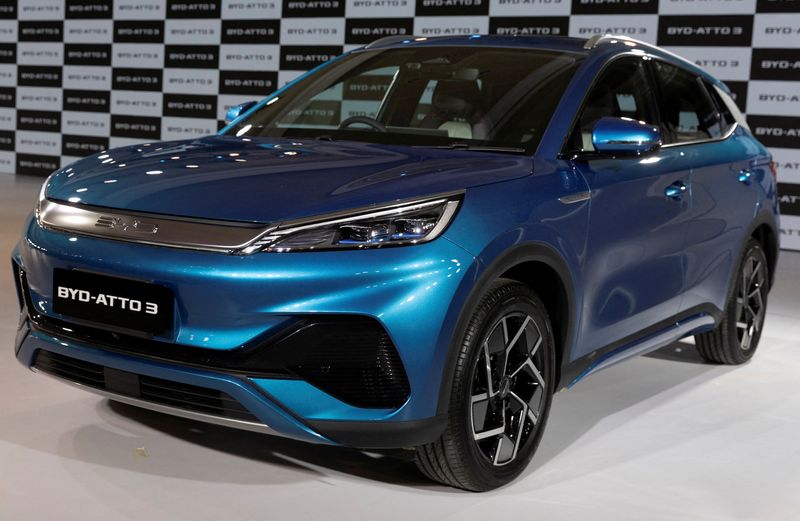By Sarita Chaganti Singh
NEW DELHI (Reuters) - China's BYD has told its India joint-venture partner it would shelve plans for a new $1-billion investment to build electric cars after its investment proposal faced scrutiny from New Delhi, two people with knowledge of the discussions said.
BYD and its partner, privately held Megha Engineering and Infrastructures submitted a proposal to the Indian government in April to jointly build electric cars in India, Reuters reported earlier this month.
But in the initial review, officials from three Indian ministries, including finance and external affairs, raised what two Indian officials described as security concerns about investment from the Chinese company and signalled opposition.
BYD executives told Megha Engineering last week that the battery and EV maker wanted to drop pursuit of the investment, according to the two people with knowledge of that exchange.
It was not immediately clear whether BYD could have second-thoughts, and as of Thursday BYD had not formally withdrawn the investment proposal from government review, the two officials with knowledge of the review said.
BYD, China's largest EV maker, declined to comment on the status of its investment proposal and whether it would pull the plan to produce electric cars in India.
In a statement to Reuters, the company said it has had a presence in India for 16 years, selling both passenger cars and electric-drive buses.
India's finance, external affairs and home ministry did not reply to an email seeking comment. Megha Engineering did not respond to request to comment.
During a meeting last week, Hyderabad-based Megha Engineering urged BYD to wait for more clarity on the situation before moving to drop the electric cars manufacturing plan, according to the two people with knowledge of the discussion.
BYD had understood its investment proposal would be politically charged because of the scrutiny of Chinese investment in India and had attempted to head off concerns, the two people with knowledge of its planning said.
For instance, the proposal said voice-activated commands for apps would be available in Indian languages in BYD electric cars built in India and that all data from the vehicles would be housed in India, one of the people said.
BYD had proposed starting production in India by 2025, the people familiar with the plan said.
India began subjecting investment from China to closer scrutiny in 2020 amid a series of border clashes between the two countries.
China's Great Wall Motor shelved its plans to invest $1 billion after failing to get clearances from the Indian government.
A final decision on whether to approve BYD's investment proposal would be taken by Indian ministries of trade and heavy industries.
BYD, the world's largest producer of EVs and plug-in hybrid vehicles, entered the Indian market in 2007 producing batteries and components for mobile phone makers.
In 2013 it started building electric buses in India with Megha Engineering, under a joint venture company called Olectra Greentech.
BYD, which has already invested over $200 million in India, markets the Atto 3 electric SUV and the e6 EV to corporate fleets and plans to launch sales of its Seal electric sedan later this year.

BYD has sold about 1,950 cars in India since starting sales in 2022, according to government registration data.
India's EV market is small but growing with domestic automaker Tata Motors (NYSE:TTM) dominating sales. Electric models made up less than 2% of total car sales in 2022 but the government wants to grow this to 30% by 2030.